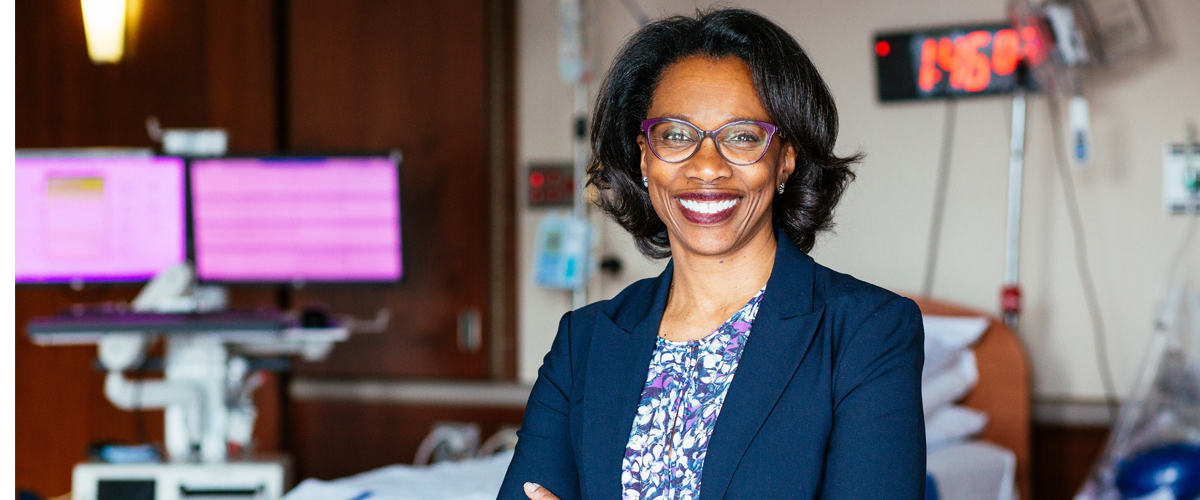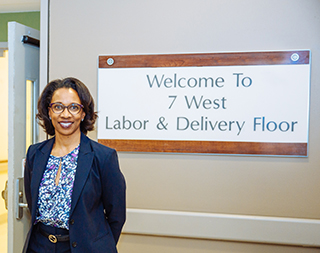Inside NYP: Dr. Laura Riley
How this obstetrician and gynecologist-in-chief is standing up for high-risk pregnant moms.

I knew by age 9 that I wanted to become a doctor. My mother worked as the front desk manager at Boston Children’s Hospital, so I spent every school vacation in the emergency room or the operating room. I saw my first neurosurgery when I was 13. I never fainted. I was very committed to becoming a doctor. I was also inspired by what I saw on television. My favorite shows were Marcus Welby, M.D. and Medical Center. They saved every life. It was always a good news story.
My West Indian parents were all about education, and they sacrificed so I could attend a fancy private school. I ultimately went to Harvard undergrad and then medical school at the University of Pittsburgh, where seven out of 170 of us were black. There were three men and four women, and we struggled mightily at times, but we stuck together and all survived.
I decided to pursue OB/GYN because so many patients experience happy endings. As a resident, I loved obstetrics! I decided to focus on maternal-fetal medicine, or high-risk obstetrics, because I really liked the complexity of cases that came before me. Ninety-nine percent of the time, the outcomes were good, even if they were high-risk.
I’m from Dorchester, the inner city of Boston, and had always intended to work in the community that I grew up in. By 1989 I was married to my husband, an attorney, and we moved back to the area. I did my fellowship at Brigham and Women’s Hospital, and my first job was at Boston City Hospital. It was the early days of the HIV epidemic, and I really wanted to work with HIV-positive patients. I started the hospital’s first HIV clinic for women. By the time I left four years later, about 30 percent of our HIV-positive women had died. I was emotionally spent. I had picked this specialty because of their “happy endings,” and here these women were dying and, in the early years, we didn’t know what to do about it. Also, I was having my first of two daughters, now 26 and 22, and this was emotionally too much.
So I went to Massachusetts General Hospital, where I stayed for 23 years. Mass General Hospital didn’t deliver babies until the year I began, and I helped build the OB service from the ground up. That first year, we did around 800 deliveries. By the time I left, we did 3,800 deliveries with a staff of 20 general OB/GYNs, 10 high-risk maternal-fetal medicine specialists, and 11 midwives. It was a great place to be.
Another reason why I wanted to come here was the leadership’s commitment to reducing maternal mortality.
Dr. Laura Riley
My early days working with HIV patients led to my specialization in obstetric infectious diseases. I’ve worked with the CDC and OB/GYN organizations that spearheaded the U.S. response on how to handle pregnant women with Zika, Ebola, and H1N1, all infectious diseases that have the potential to become devastating in the U.S. In fact, the H1N1 flu epidemic in 2009 was devastating. We saw deaths across the country because pregnant women get much sicker than nonpregnant adults when they are infected with the flu. I’ve worked hard, along with other OB and infectious disease specialists, to make sure that we are getting people to understand the importance of the flu vaccine in pregnancy. I’m a full believer in the safety that the flu shot affords pregnant women because the risk of death and severe illness in pregnancy is high. I am the flu shot queen.
What excited me most about coming to NewYork-Presbyterian was the Alexandra Cohen Hospital for Women and Newborns, which will open in 2020. It was like a Christmas present! Once the new hospital opens, our OB/GYN services here at NewYork-Presbyterian/Weill Cornell Medical Center will move there across the street. We’re going to have this fabulous hospital just for pregnant women and newborns. I was sold. It’s an amazing space.
Learn more about NewYork-Presbyterian’s efforts to reduce maternal deaths in New York State and nationally. Click here.
Women can have whatever birth experience they desire in a place with great doctors and nurses. It will be much more focused on high-risk pregnancies. If you need all the bells and whistles because of complications or your baby’s complications, they’ll be there. If you don’t have complications, you should just have a really nice, easy birth experience surrounded by your support team.
The new hospital’s 75 single-room postpartum beds are the most exciting thing for me. During your first few days with your newborn, you want your partner to be able to stay with you and your family to be comfortable.

Another reason why I wanted to come here was the leadership’s commitment to reducing maternal mortality. It’s been on the rise in the U.S., despite the fact that it is declining globally. They said, “We need to solve this. We’re going to give you the resources to do it.” I was like, “I’m your woman!”
When I was president of the Society for Maternal-Fetal Medicine in 2015, I said we need to deal with the racial and ethnic disparities in maternal health. Little attention was being paid to the inequities. Black women are three to four times more likely to die in the U.S. during pregnancy and childbirth than white women. I’ve been in New York for four months now, and I’ve learned one thing: New Yorkers want to be No. 1 in everything. Yet New York ranks 30 out of 50 for maternal mortality. And even worse, in New York City, black women are eight times more likely to die in pregnancy and childbirth. This is a huge problem. So I’m looking forward to working with Dr. Mary D’Alton, my counterpart at NewYork-Presbyterian/Columba University Irving Medical Center, to expand initiatives to reduce maternal deaths in New York. Dr. D’Alton was my mentor when I began my career in high-risk obstetrics, and we’ve collaborated on the issue of maternal mortality nationally. Now, we are committed to working together to get us to the finish line.
One of the appealing things about being a department chair is that you get to mentor a lot of really smart people and help them in various aspects of their career, whether it’s medical students, residents, or junior faculty. So I look forward to that. I’ve been hugely interested in increasing the diversity among residents and mentoring them through their careers. My mentors have been so instrumental in my career, and I enjoy providing that support and sponsorship to others to hopefully make a difference in their lives.
Laura Riley, M.D., is obstetrician and gynecologist-in-chief at NewYork-Presbyterian/Weill Cornell Medical Center and chair of the Department of Obstetrics and Gynecology at Weill Cornell Medicine. She leads the obstetrics and gynecology enterprise at Weill Cornell Medicine and NewYork-Presbyterian/Weill Cornell Medical Center — which encompasses seven divisions and more than 50 full-time clinical faculty who deliver care at six practice sites — as well as at NewYork-Presbyterian Lower Manhattan Hospital, NewYork-Presbyterian Brooklyn Methodist Hospital and NewYork-Presbyterian Queens. Dr. Riley has published over 50 articles in peer-reviewed journals and written two books for consumers, You and Your Baby: Pregnancy and You and Your Baby: Healthy Eating During Pregnancy.
